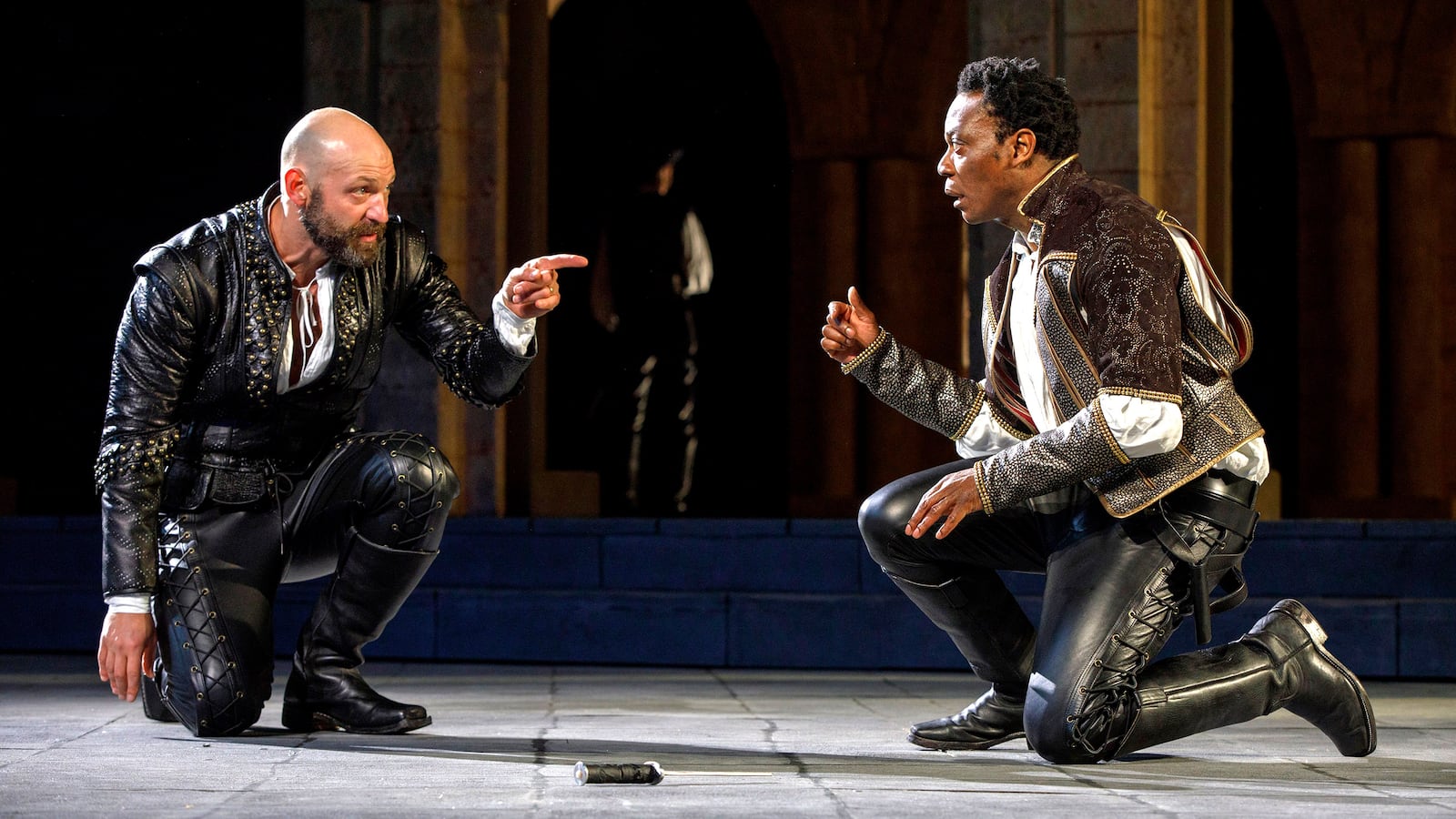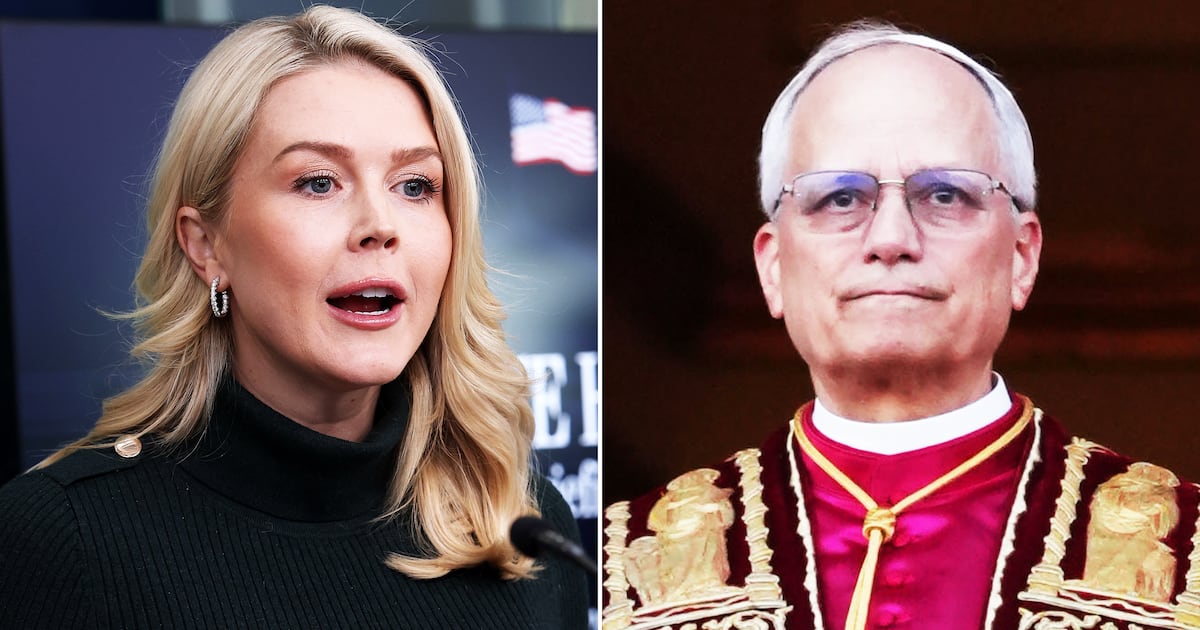‘Othello’
Whether the performance is or isn’t great, just being at “Free Shakespeare in the Park,” as produced every summer by New York’s Public Theater, is a particularly sweet bit of New York magic. This time last year, it was also a fire conductor of absurd controversy, as the right wing leapt frothingly on a performance of Julius Caesar, featuring a Trumpified central character.
In the first of this summer’s productions, Othello, directed beautifully by Ruben Santiago-Hudson, there is no overt flirtation with present-day politics. Yet every Public production at the Delacorte Theater in Central Park opens with a now-familiar statement of inclusion and principle delivered via the speakers by the theater's artistic director Oskar Eustis. “Free Shakespeare in the Park” is an exercise in cultural as well as artistic aspiration.
So, whatever anyone writes, go if you haven’t done it before. A wonderful performance at the Delacorte enhances, and is enhanced by, the surroundings; the same surroundings can supply a useful diversion from a sub-par one.
Watching a play in the open air, surrounded by the trees and shadow of the trees, early evening sunshine fading to inky night, is its own best, intensifying effect.
The most recent Othello in New York before this was Sam Gold’s turbo-macho production at the New York Theatre Workshop in late 2016, starring David Oyelowo as noble and too-easily gulled Othello and Daniel Craig as the scheming Iago, wrecking lives and love, with verbal poison deposited in multiple ears.
If that production, in tight combat fatigues, felt modern and claustrophobically intense, Santiago-Hudson’s, in traditional costume toughed-up with modern, tight leathers, takes full advantage of the Delacorte’s wide and open stage, well furnished by Rachel Hauck’s simple design of movable arches, with a lofty tower and levitating bed.

Othello remains a fascinating play, because the most complex character is not its title character, but his nemesis, Iago.
Chukwudi Iwuji plays Othello with a gravelly command that is its own rejoinder to the racism over his being a Moor, which is so virulently expressed to his face and behind his back. The play's first puzzle is that his loyalty to his beloved Desdemona (Heather Lind) leaks away far quicker than the depth of his professed love would suggest.
While we may not understand the suddenness of his fury (and his being fooled by a handkerchief), what we absolutely do understand is Iwuiji's rawly expressed, wounded betrayal, however misplaced it is.
The central couple, in this production anyway, are Iago (Corey Stoll) and his wife, Emilia (Alison Wright, giving the evening's most impressive performance as Desdemona's loyal maidservant). Stoll brings a balanced mix of wit and menace to one of theatre's greatest villains; lying to people's faces with ease, and telling us all about it. He does it, he sets out to destroy Othello, because he can and feels as if he should. We both laugh at his shameless manipulations, and are also revolted at the damage it causes.
Why Iago really does what he does is a teasing mystery (as his closing lines suggest, he'll never reveal all), but in Stoll's rich performance it seems to be about acquiring control rather than power. He delights in being an agent of chaos, and Stoll signals the extremity of his sociopathy in glancing moments of violence: a sudden verbal outburst, a frantic slapping of his own face.
Wright's commanding embodiment of Emilia—with the not-to-be-messed-with accent-edge of Wright's native North East England—signals that she knows her husband's capacity for villainy even before she has the full knowledge of it. Her final assertion of power—her insistence to speak and have her voice heard, to have the truth aired—is as much an assertion of gender equality as it is the urgent and overdue application of truth.
Just as in the 2016 production, Emilia's devotion to Desdemona—crystallized in a conversation they have about women's place in a man's world, and a patriarchal definition of marriage, and in their final scene together—is as forceful an expression of love as Othello expresses to Desdemona.
What this company does above all is make Othello the play understandable. Listen to Iwuji enunciate clearly what love means to Othello, and also what jealousy means to him. Listen to how Lind refuses to capitulate, as Desdemona, to the vilification suddenly foisted upon her. Even more minor characters like Roderigo (Motell Foster), and Cassio (Babak Tafti) make their characters understandable to us, and in return we become invested in them.
Othello may end in a galloping rush, but the clarity of this production, the interpretation and conveyance of Shakespeare's words to us, is a gift of both dramatic pleasure and comprehension, with flourishes such as Othello's murder of Desdemona, and scrapping and swordfights bought thrillingly to stage-filling life by Santiago-Hudson. Sure, the trees and darkness of Central Park are magical around you, but in this Othello there is enough magic on stage to command all your attention.
Othello is at the Delacorte Theater, NYC, until June 24. Details here.
‘Pass Over’
It is rare for an audience to leave a play in total, presumably shocked silence; but such was the response of everyone attending a recent performance of the powerful Pass Over at the Claire Tow Theater, Lincoln Center, which opens Monday night.
Antoinette Nwandu's play, imaginatively directed on an almost bare stage by Danya Taymor, seems, initially, to be about two close friends, Moses (John Michael Hill) and Kitch (Namir Smallwood). These two young black men in their early 20s are hanging on a street that is both their patch, but also their prison. They want something else from life. They're not sure what. They call each other the 'n' word freely, with affection and not-affection.
On Wilson Chin's sparse set, the most dominant piece of furnishing is a street light, which futters in and out of life. There's a small wire mesh cage to sit on, and a metallic stand.
But we are not just in a modern city. The program tells us that as well as a ghetto street, we should also imagine we are on a plantation in 1855, and Egypt, a civilization built by slaves, in the 13th century BCE. Nwandu's point is that racism has roots, long and unyielding. (A filmed version of the Steppenwolf production of the play, directed by Spike Lee and also starring Hill, is streaming on Amazon Prime.)
The play is at once very real, while also dwelling in a kind of magical, non-literal space, leaping across time and defying reality. When a police car approaches (unseen by us), Marcus Doshi's shafts of blue lighting suspend both Moses and Kitch in frozen fear.

The play's most mysterious figure is played by Gabriel Ebert, who serves on the LCT's artists' committee. The white Ebert is dressed in upper class-signaling flannels. Weirder, this blankly chilling guest is carrying a basket with food for a picnic with his grandmother. If he seems like Little Red Riding Hood, lost and from another time and possibly the world of fairytale and allegory—his provisions include an (all-American) apple pie—then he is also the Big Bad Wolf. (In the play's neatest optical illusion his picnic basket is bottomless.)
There is the bantering friendship-based humor between the excellent Hill and Smallwood, and also in the cultural disconnect and mistrust with the white interloper in their midst (they challenge Ebert to say the 'n' word), and cannot understand why he is there. But the laughter is uneasy: there is something utterly sinister about Ebert's character and his repetition of "gee golly gosh." Ebert also appears later as not just an abusive, racist policeman, but also a sexually abusive one.
Nwandu herself has said that the play is about "two young black men deeply disenfranchised by society and community." The inspiration for her writing it was the anger she felt over the death of Trayvon Martin and subsequent acquittal of George Zimmerman for his death. In her teaching career, she has come into contact with you young black and brown men who are victims of stop-and-frisk and "constantly in peril of getting caught up in different systems."
The play was an effort on her part to "keep engaged in the American experiment as a citizen of this country who is feeling so angry and betrayed by what the country is." Pass Over is intended to ask of its audiences, she said: "Are we a nation that values young black men's lives? Who are we as a nation?"
The play does this extremely effectively, and offers no easy answers; indeed, only an incident that comes from another realsm offers Kitch the opportunity to exclaim delightedly: "We've transcended race," near the end.
Nwandu covers so much in this lean, resonant 85-minute play: friendship, fear, racism, power, control, and a black powerlessness and sense of abuse that has soaked so much into the skins of Moses and Kitch they consider, a terrible way out. There is also, near the end, a transformative expression of black power.
But Pass Over isn't done; Nwandu has a far harsher, and deadlier, message to convey about white privilege and power, its exercise over centuries and maintenance into unseen futures. Confronted with that, and the play's damning, final words and horrible guttural sounds, is perhaps why a mostly white audience left the Claire Tow Theater in total silence.
Pass Over will run at Claire Tow Theater, Lincoln Center Theater, until July 15. Book here.






